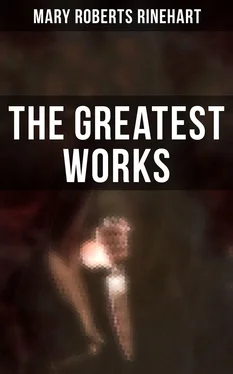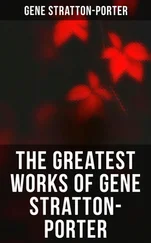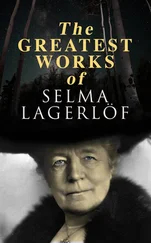"Just a twinge," I said, when she glanced up quickly. "It's very good of you to let me know, Miss West. I have been hearing delightful things about you for three months."
"From Richey McKnight?" She was frankly curious.
"Yes. From Richey McKnight," I assented. Was it any wonder McKnight was crazy about her? I dug my heels into the dust.
"I have been visiting near Cresson, in the mountains," Miss West was saying. "The person you mentioned, Mrs. Curtis, was my hostess. We—we were on our way to Washington together." She spoke slowly, as if she wished to give the minimum of explanation. Across her face had come again the baffling expression of perplexity and trouble I had seen before.
"You were on your way home, I suppose? Richey—spoke about seeing you," I floundered, finding it necessary to say something. She looked at me with level, direct eyes.
"No," she returned quietly. "I did not intend to go home. I—well, it doesn't matter; I am going home now."
A woman in a calico dress, with two children, each an exact duplicate of the other, had come quickly down the road. She took in the situation at a glance, and was explosively hospitable.
"You poor things," she said. "If you'll take the first road to the left over there, and turn in at the second pigsty, you will find breakfast on the table and a coffee-pot on the stove. And there's plenty of soap and water, too. Don't say one word. There isn't a soul there to see you."
We accepted the invitation and she hurried on toward the excitement and the railroad. I got up carefully and helped Miss West to her feet.
"At the second pigsty to the left," I repeated, "we will find the breakfast I promised you seven eternities ago. Forward to the pigsty!"
We said very little for the remainder of that walk. I had almost reached the limit of endurance: with every step the broken ends of the bone grated together. We found the farm-house without difficulty, and I remember wondering if I could hold out to the end of the old stone walk that led between hedges to the door.
"Allah be praised," I said with all the voice I could muster. "Behold the coffee-pot!" And then I put down the grip and folded up like a jack-knife on the porch floor.
When I came around something hot was trickling down my neck, and a despairing voice was saying, "Oh, I don't seem to be able to pour it into your mouth. Please open your eyes."
"But I don't want it in my eyes," I replied dreamily. "I haven't any idea what came over me. It was the shoes, I think: the left one is a red-hot torture." I was sitting by that time and looking across into her face.
Never before or since have I fainted, but I would do it joyfully, a dozen times a day, if I could waken again to the blissful touch of soft fingers on my face, the hot ecstasy of coffee spilled by those fingers down my neck. There was a thrill in every tone of her voice that morning. Before long my loyalty to McKnight would step between me and the girl he loved: life would develop new complexities. In those early hours after the wreck, full of pain as they were, there was nothing of the suspicion and distrust that came later. Shorn of our gauds and baubles, we were primitive man and woman, together: our world for the hour was the deserted farm-house, the slope of wheat-field that led to the road, the woodland lot, the pasture.
We breakfasted together across the homely table. Our cheerfulness, at first sheer reaction, became less forced as we ate great slices of bread from the granny oven back of the house, and drank hot fluid that smelled like coffee and tasted like nothing that I have ever swallowed. We found cream in stone jars, sunk deep in the chill water of the spring house. And there were eggs, great yellow-brown ones, a basket of them.
So, like two children awakened from a nightmare, we chattered over our food: we hunted mutual friends, we laughed together at my feeble witticisms, but we put the horror behind us resolutely. After all, it was the hat with the green ribbons that brought back the strangeness of the situation.
All along I had had the impression that Aliaon West was deliberately putting out of her mind something that obtruded now and then. It brought with it a return of the puzzled expression that I had surprised early in the day, before the wreck. I caught it once, when, breakfast over, she was tightening the sling that held the broken arm. I had prolonged the morning meal as much as I could, but when the wooden clock with the pink roses on the dial pointed to half after ten, and the mother with the duplicate youngsters had not come back, Miss West made the move I had dreaded.
"If we are to get into Baltimore at all we must start," she said, rising. "You ought to see a doctor as soon as possible."
"Hush," I said warningly. "Don't mention the arm, please; it is asleep now. You may rouse it."
"If I only had a hat," she reflected. "It wouldn't need to be much of one, but—" She gave a little cry and darted to the corner. "Look," she said triumphantly, "the very thing. With the green streamers tied up in a bow, like this—do you suppose the child would mind? I can put five dollars or so here—that would buy a dozen of them."
It was a queer affair of straw, that hat, with a round crown and a rim that flopped dismally. With a single movement she had turned it up at one side and fitted it to her head. Grotesque by itself, when she wore it it was a thing of joy.
Evidently the lack of head covering had troubled her, for she was elated at her find. She left me, scrawling a note of thanks and pinning it with a bill to the table-cloth, and ran up-stairs to the mirror and the promised soap and water.
I did not see her when she came down. I had discovered a bench with a tin basin outside the kitchen door, and was washing, in a helpless, one-sided way. I felt rather than saw that she was standing in the door-way, and I made a final plunge into the basin.
"How is it possible for a man with only a right hand to wash his left ear?" I asked from the roller towel. I was distinctly uncomfortable: men are more rigidly creatures of convention than women, whether they admit it or not. "There is so much soap on me still that if I laugh I will blow bubbles. Washing with rainwater and home-made soap is like motoring on a slippery road. I only struck the high places."
Then, having achieved a brilliant polish with the towel, I looked at the girl.
She was leaning against the frame of the door, her face perfectly colorless, her breath coming in slow, difficult respirations. The erratic hat was pinned to place, but it had slid rakishly to one side. When I realized that she was staring, not at me, but past me to the road along which we had come, I turned and followed her gaze. There was no one in sight: the lane stretched dust white in the sun,—no moving figure on it, no sign of life.
Chapter X.
Miss West's Request
Table of Contents
The surprising change in her held me speechless. All the animation of the breakfast table was gone: there was no hint of the response with which, before, she had met my nonsensical sallies. She stood there, white-lipped, unsmiling, staring down the dusty road. One hand was clenched tight over some small object. Her eyes dropped to it from the distant road, and then closed, with a quick, indrawm breath.
Her color came back slowly. Whatever had caused the change, she said nothing. She was anxious to leave at once, almost impatient over my deliberate masculine way of getting my things together. Afterward I recalled that I had wanted to explore the barn for a horse and some sort of a vehicle to take us to the trolley, and that she had refused to allow me to look. I remembered many things later that might have helped me, and did not. At the time, I was only completely bewildered. Save the wreck, the responsibility for which lay between Providence and the engineer of the second section, all the events of that strange morning were logically connected; they came from one cause, and tended unerringly to one end. But the cause was buried, the end not yet in view.
Читать дальше












